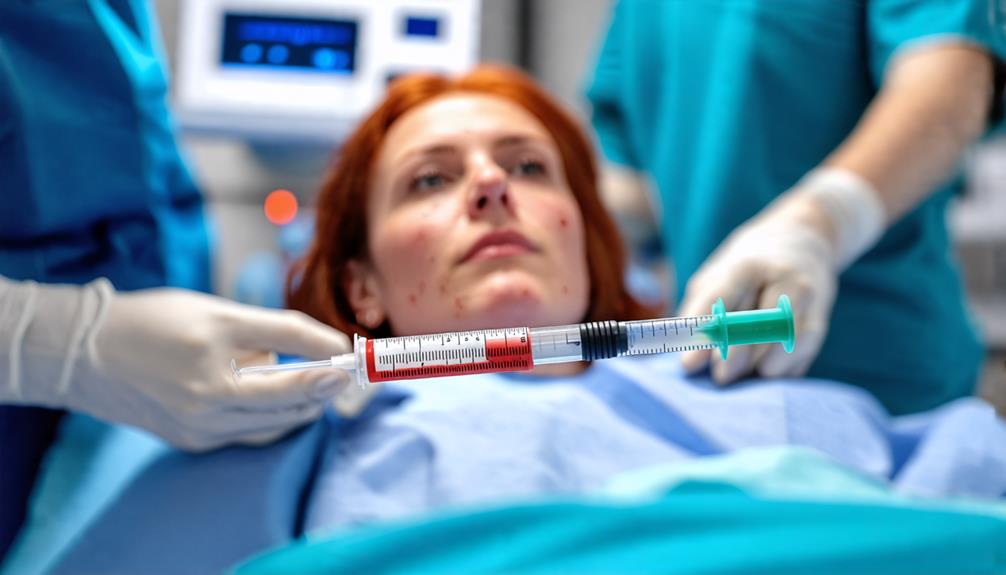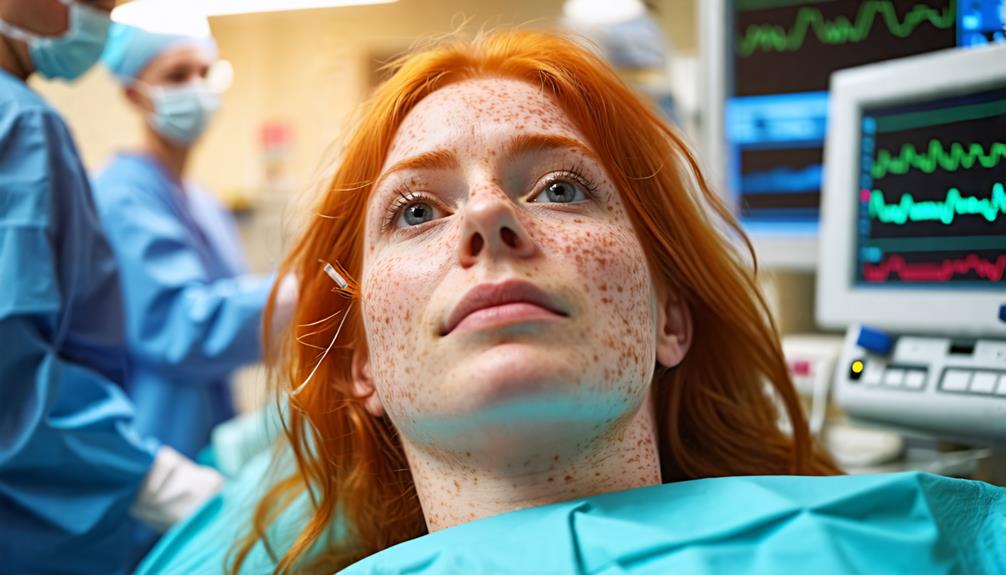Redheaded People May Require More Anesthesia
You might've heard that redheads need more anesthesia, but have you ever wondered why? It's not just an old wives' tale; there's actual science behind it. The unique genetic makeup of redheads affects more than just their hair color—it also influences their pain sensitivity and response to certain medications. This fascinating connection between hair color and medical treatment has important implications for healthcare providers and patients alike. As you consider the potential impact on medical procedures, you'll find there's much more to this phenomenon than meets the eye.
Key Takeaways
- Redheads typically need about 20% more general anesthesia for effective sedation due to genetic variations.
- Mutations in the MC1R gene, responsible for red hair, affect pain sensitivity and response to anesthetics.
- Local anesthetics like lidocaine may be less effective in individuals with red hair.
- Research shows higher doses of desflurane are needed for redheads compared to dark-haired individuals.
The Science Behind Red Hair

The striking red locks that turn heads are rooted in a fascinating genetic quirk: mutations in the melanocortin 1 receptor (MC1R) gene. Located on chromosome 16, this gene plays an essential role in melanin production and pigmentation. If you’re a redhead, you likely inherited two copies of the mutated MC1R gene from your parents. This genetic phenotype is rare, with less than 2% of the global population sporting natural red hair. Red hair not only stands out due to its vibrant hue but also comes with unique characteristics. Individuals with red locks often have fair skin that is more sensitive to sun exposure, leading to an increased risk of sunburn. The striking color red in the shining light can create a truly mesmerizing effect, as it seems to glow with an intensity that captures attention and admiration. Moreover, the allure of red hair extends beyond mere aesthetics; it often sparks curiosity and fascination. However, those with this unique trait must also navigate certain lifestyle considerations, such as understanding the pistachio spontaneous combustion risks associated with the mishandling of some nuts, which can lead to unexpected fires. As such, redheads not only captivate with their distinct appearance but also embody a blend of intriguing genetics and mindful living amidst their vibrant lives.
Interestingly, the MC1R gene doesn't just influence your hair color; it also affects pain sensitivity. This connection might explain why redheads often require more anesthesia during medical procedures. Common mutations like R151C, R160W, and D294H are found in 93% of red-haired individuals, with at least one dysfunctional allele present. These genetic variations could impact how your body responds to both general and local anesthetic.
Anesthesia Considerations for Redheads
If you're a redhead, you'll likely need more anesthesia during medical procedures due to your unique genetic makeup. The MC1R gene mutation affects your pain sensitivity and anesthetic needs, often requiring about 20% more anesthesia for effective sedation. This difference is particularly noticeable with local anesthetics like lidocaine, which may be less effective for you during dental procedures.
Research confirms that redheads require higher doses of anesthesia, such as desflurane, compared to dark-haired individuals. To guarantee proper pain management, it's vital to communicate your hair color and previous anesthesia experiences in medical settings.
Anesthesiologists should tailor doses based on your individual needs, considering the unique pain response associated with red hair. By being aware of these factors, you can help healthcare providers make informed decisions about your anesthetic requirements during various medical and dental procedures.
Implications for Medical Care

Understanding the unique anesthetic needs of redheads can greatly impact medical care practices and patient outcomes. If you have red hair, you may need more anesthesia during medical and dental procedures. This is due to MC1R variants affecting your pain sensitivity and response to anesthetics. You'll likely require about 20% more general anesthesia, and local anesthesia might be less effective for you, especially lidocaine.
To guarantee your comfort and safety, it's essential to communicate your red hair and potential anesthetic needs to healthcare providers before any procedure. Anesthesiologists should tailor doses and monitor you closely during treatment.
Conclusion
If you're a redhead, you're likely to need more anesthesia during medical procedures.
Don't hesitate to inform your healthcare providers about your hair color and past anesthesia experiences. This information can help anesthesiologists adjust dosages for your comfort and safety.
Remember, your genetic makeup affects how you respond to pain and anesthetics. By speaking up, you're ensuring you receive the most appropriate care tailored to your unique needs.











